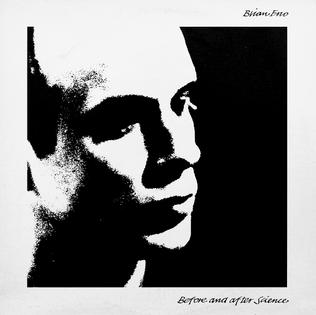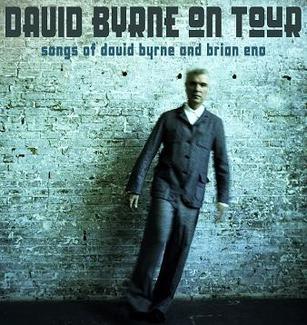
Ambient music is a genre of music that emphasizes tone and atmosphere over traditional musical structure or rhythm. It may lack net composition, beat, or structured melody. It uses textural layers of sound that can reward both passive and active listening and encourage a sense of calm or contemplation. The genre is said to evoke an "atmospheric", "visual", or "unobtrusive" quality. Nature soundscapes may be included, and the sounds of acoustic instruments such as the piano, strings and flute may be emulated through a synthesizer.

Another Green World is the third solo studio album by Brian Eno, released by Island Records on 14 November 1975. The album marked a transition from the rock-based music of Eno's previous releases toward the minimalist instrumentals of his late 1970s ambient work. Only five of its fourteen tracks feature vocals, a contrast with his previous vocal albums.

Before and After Science is the fifth solo studio album by Brian Eno, originally released by Polydor Records in December 1977 in the United Kingdom and by Island U.S. soon after. Produced by Eno and Rhett Davies, it is the first of Eno's popular music works to be published under his full name.
Oblique Strategies is a card-based method for promoting creativity jointly created by musician/artist Brian Eno and multimedia artist Peter Schmidt, first published in 1975. Physically, it takes the form of a deck of 7-by-9-centimetre printed cards in a black box. Each card offers a challenging constraint intended to help artists break creative blocks by encouraging lateral thinking.

The VCS 3 is a portable analog synthesizer with a flexible modular voice architecture introduced by Electronic Music Studios (EMS) in 1969.

Taking Tiger Mountain (By Strategy) is the second solo studio album by Brian Eno (mononymously credited as "Eno"), released in November 1974 by Island Records. Unlike his debut album Here Come the Warm Jets, which featured 16 musicians, this album utilized a core band of five instrumentalists: Eno (keyboards, guitar), Phil Manzanera (guitar), Brian Turrington (bass guitar), Freddie Smith (drums), and Robert Wyatt (percussion). Manzanera also participated in the writing and production. To help guide the musicians, Eno and Peter Schmidt developed instruction cards called Oblique Strategies to facilitate creativity during the recording process.

Cluster & Eno is a collaborative album by German electronic music group Cluster and English ambient musician Brian Eno. The style of this album is a collection of gentle melodies: a mixture of Eno's ambient sensibilities and Cluster's avant-garde style.

Here Come the Warm Jets is the debut solo album by Brian Eno, released on Island Records on 8 February 1974. It was recorded and produced by Eno following his departure from Roxy Music, and blends glam and pop stylings with avant-garde approaches. The album features numerous guests, including several of Eno's former Roxy Music bandmates along with members of Hawkwind, Matching Mole, Pink Fairies, Sharks, Sweetfeed, and King Crimson. Eno employed unusual directions and production methods to coax unexpected results from the musicians.

The Equatorial Stars is the third collaborative studio album by the duo of Robert Fripp and Brian Eno. The album was released in 2004, which marked almost 30 years since the two musicians had collaborated on their second album, Evening Star, in 1975.

Music for Films is the seventh solo studio album by Brian Eno, released in September 1978 on EG Records. His third release of experimental electronic material, it is a conceptual work intended as a soundtrack for imaginary films, although many of the pieces had already appeared in actual films. It charted at #55 on the UK.

More Blank Than Frank and Desert Island Selection are 1986 compilation albums of music by Brian Eno. More Blank Than Frank is the title given to the vinyl LP and cassette releases, and Desert Island Selection is the name used for the CD version. The three versions were issued at the same time, though they differ somewhat in the ordering and in the songs that were used. The LP features 10 tracks, the cassette, 12, and the CD, 11.

Music for Films III is the third entry in Brian Eno's "Music for Films" series. It was the first in the series to include music from artists other than Brian Eno, including Roger Eno, Michael Brook, Laraaji, and Harold Budd, among others, with Brian Eno involved with the production of all tracks.

Paul Fraser Rudolph is a Canadian guitarist, bassist, singer, and cyclist. He made his mark in the UK underground music scene, and then as a session musician, before returning to Canada to indulge his passion for cycling. He resided in Gibsons, British Columbia, where he owned and operated a bicycle business, Spin Cycle. He has since retired to Victoria, British Columbia.

January 07003 is the twenty-first solo studio album by Brian Eno, released in 2003.

The Songs of David Byrne and Brian Eno Tour is a 2008–2009 promotional concert tour of music co-written by David Byrne and Brian Eno with performances by Byrne. In addition to being a retrospective of the duo's collaborations, the tour promoted the album Everything That Happens Will Happen Today. The musical performers were accompanied by dancers who were choreographed to several songs. Performances were held across the world and later documented on a tour EP and a concert film.
"Baby's on Fire" is the third track on English musician Brian Eno's 1974 debut solo album Here Come the Warm Jets.

Brian Peter George Eno, also mononymously known as Eno, is an English musician, songwriter, record producer and visual artist. He is best known for his pioneering contributions to ambient music and electronica, and for producing, recording, and writing works in rock and pop music. A self-described "non-musician", Eno has helped introduce unconventional concepts and approaches to contemporary music. He has been described as one of popular music's most influential and innovative figures. In 2019, he was inducted into the Rock and Roll Hall of Fame as a member of Roxy Music.

Small Craft on a Milk Sea is a 2010 album by British musician and record producer Brian Eno. The album—his debut with Warp—was released in Japan on 19 October 2010, in the United States on 2 November, and the United Kingdom on 15 November. The album was recorded with collaborators Jon Hopkins and Leo Abrahams in 2009 and 2010 and was released in several formats, including Compact Disc; digital download; a box set featuring the album on Compact Disc, vinyl, and download, a bonus CD with four extra tracks, and a lithograph by Eno; and another box set with all of the previous media and a 12" square silkscreen print by Eno and a copper plate.

(No Pussyfooting) is the debut studio album by the British duo Fripp & Eno, released in 1973. (No Pussyfooting) was the first of three major collaborations between the musicians, growing out of Brian Eno's early tape delay looping experiments and Robert Fripp's "Frippertronics" electric guitar technique.

The Ship is the twenty-sixth solo studio album by Brian Eno, released on 29 April 2016 on Warp Records. Announced on Eno's website on 24 February 2016, it was Eno's first solo album to contain vocals since 2005's Another Day on Earth. The Ship debuted at number 28 on the UK Albums Chart and is the second highest-charting solo album of Eno's solo career The album received critical acclaim.


















